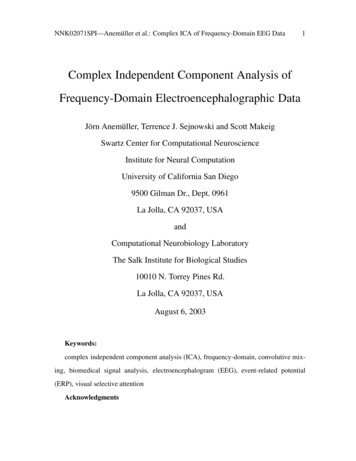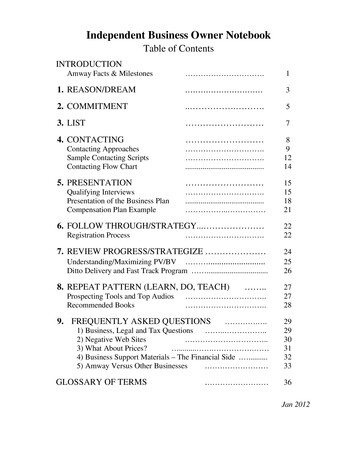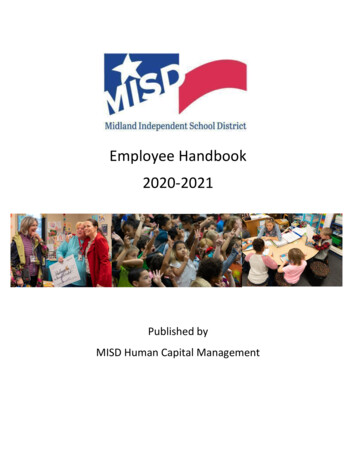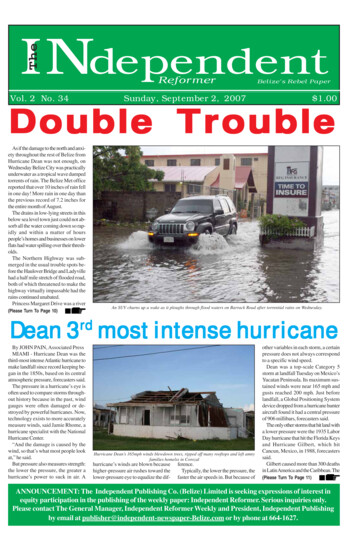
Transcription
I N D EPEN D EN T P U B L I C AT I O N BYRACONTEUR.NET#07282 9/ 0 3 / 2 0 2 1FUTURE OFINSURANCETRAVEL TAKEOFF AGAIN?03 WILL19673 ADVT 264x50mm banner for Raconteur Future of Insurance FINAL2.indd 114THE RISE OF INSTANTINSURANCE18FIGHTING INSURANCEFRAUDSTERS06/02/20 12:57:56
RACONTEUR.NETFUTURE OFINSURANCETR AVEL INSUR ANCEHow will traveltake off again?Distributed inAs the UK government debates whether to relax restrictions on travellingabroad for holidays and business this summer, the travel insurance industryis firmly focused on how it will bounce back from 12 months of painPublished in association withContributorsClare BettelleyRichard BrownBusiness journalist,specialising in humanresources, employeebenefits and health andwellbeing issues, whohas held editorships atFinancial Times Businessand Centaur Media.Journalist, investigativereporter and presenter,he has coveredconflict and corporatecontroversies, andworks as Middle Eastcorrespondent forIl Giornale.Marianne CurpheyVirginia MatthewsAward-winning financialwriter, blogger andcolumnist writing forvarious publications,and former staff at TheGuardian and The Times.Award-winning journalistspecialising in business,education and peoplemanagement, writing fornational newspapers andspecialist business titles.Charles Orton-JonesRosalyn PageJonathan WeinbergAlex WrightPublishing managerDesignWas editor-at-large ofLondonlovesBusiness.com and editor ofEuroBusiness magazine.Award-winning journalistcovering tech, marketing,business and culture,with stories published inWhich, HomeWork, CMO,and Choice.Business journalistwriting for internationalfinance trade publicationsincluding Acuity,Insurance Times andRisk & Insurance.Kellie JerrardColm McDermottSamuele MottaNita SaroglouJack WoolrichSean Wyatt-LivesleyClement AroManaging editorSarah VizardDeputy editorFrancesca CassidyIllustrationAssociate editorPeter ArcherSara GelfgrenJack WoolrichHead of productionArt directorJoanna BirdHannah SmallmanDesign directorTim WhitlockAlthough this publication is funded through advertising andsponsorship, all editorial is without bias and sponsored featuresare clearly labelled. For an upcoming schedule, partnershipinquiries or feedback, please call 44 (0)20 3877 3800 oremail info@raconteur.netRaconteur is a leading publisher of special-interest content andresearch. Its publications and articles cover a wide range of topics,including business, finance, sustainability, healthcare, lifestyle andtechnology. Raconteur special reports are published exclusively inThe Times and The Sunday Times as well as online at raconteur.netThe information contained in this publication has been obtainedfrom sources the Proprietors believe to be correct. However,no legal liability can be accepted for any errors. No part of thispublication may be reproduced without the prior consent of thePublisher. Raconteur Media@raconteur/raconteur.netraconteur.netPhilip Myrtorp via UnsplashJonathan WeinbergJournalist, writer andmedia consultantspecialising in technology,business, social impactand the future of workand society.03@raconteur london/future-insurance-2021ew industries have beenhit harder by coronavirusthan travel and, with holidaymakers and business travellersforced to stay at home for much of thepast year, demand for travel insurance has unsurprisingly plummeted.As the pandemic set in, there wasmuch confusion among travellerswith insurance policies over who wasresponsible for paying out when theirplans were cancelled or curtailed.But now the picture is becoming clearer and, ahead of the UK'sborders opening up, insurers haveworked hard to make cover levelsand exclusions easy to understand.However, according to Defaqto,there is still a wide variation of coverfor people to navigate. Its researchthis March found that while 73 percent of the 978 single-trip policiesit checked would cover cancellation following a positive COVID test,just 32 per cent would cover it due toself-isolation.Additionally, only 2 per centwould cover the costs of beingquarantined abroad and noneoffered cover for cancellation due tofurther lockdowns.Anna-Marie Duthie, travel insurance expert at Defaqto, explainsthat most insurers will now coverthe costs of medical treatment ifyou catch COVID on holiday. Butshe says: "Compared with the startof 2020, the travel industry hasalready seen a fall of around 15 percent in the number of travel insurers and policies in the market. It islikely that many of these insurerswill not return."We have already seen travel premiums increase since the start ofthe pandemic. Insurers will be pricing to take account of the losses theyhave suffered, but it is still a competitive market so recouping large losseswill be difficult. It is unlikely thoughthat we will see the return of the verycheap travel policies, such as thosewhich existed at the start of 2020."Antony Martin, managing director of travel insurance companyInsurefor.com, agrees. He says travelinsurance policies have already hadprice rises of around 15 per cent totake account of COVID cover."There have been significantincome losses due to customers nottravelling, but this has not impactedinsurance performance, so we donot expect rates to increase muchfurther over the next 12 months,"says Martin.FWhen it comes to travel protection,much is already offered by travelproviders in the first instance, andmany experts believe they will haveto shoulder more risk going forward.The Association of British Insurers(ABI) says the travel insuranceindustry has paid out an estimated 152 million since the pandemicbegan, but explained how travelinsurance is not an alternative toany legal obligations on others, citing its main purpose is to provideemergency overseas medical cover.The ABI says that, where thereis policy cover for those forced to78%32%cancel their travel plans or whohave faced travel disruption due toCOVID, it will kick in if refunds arenot firstly obtainable from airlines,accommodation providers and touroperators, as well as via section 75credit card refunds and debit cardchargeback claims.Sarah Brodie, ABI general insurance policy adviser, explains:"Customers should check the termsand conditions, as policies soldsince COVID-19 was declared a pandemic are likely to contain someexclusions for cancellation cover.Travel insurance is designed andof current single-trip travelinsurance policies checked wouldcover cancellation following apositive COVID testwould cover it dueto self-isolation15%drop in the numberof travel insurersand policies on themarket, thanks toCOVID-19Defaqto 2021priced to cover unforeseen riskswhen the policy is taken out. It isimportant to note that it is the policyholder's responsibility to meetany border requirements, for example a negative COVID-19 test."No insurer seeks to hide behindnumerous terms and conditions,and travel insurers will continue todo all they can to ensure policies areas clear and as user-friendly as possible, to give travellers the reassurance they need."Nicky Kelvin at advice website ThePoints Guy UK also believes thisclarity will be paramount. "Smallprint when it comes to COVID-19 willlikely have to become more transparent,” he says. “Comparison sitesare already showing which policieshave such cover and customers maybe choosing policies on this basis, soinsurers may have to be more transparent to remain competitive."Matt Connolly, of Sønr, a marketintelligence business that tracksinsurance innovation around theworld, believes the pandemic shouldsignal a chance for transformation,especially when it comes to makingthe claims process more seamlesswith digital technology.One trend being explored by anumber of insurers is parametric insurance, where a customertakes insurance out and if their tripdoesn't happen for some reason, theclaim is immediately triggered andmoney refunded.Connolly says: "My recommendation to insurers is to study the innovation taking place in the marketand capitalise on the opportunities out there. If your strategy is tocopy what's already in-market, whatyou're actually copying is the artefact of past effort."Avi Meir, co-founder and chiefexecutive of business travel managementcompanyTravelPerk,believes flexibility must now be theoverriding principle. "Thanks to anever-changing patchwork of regulations and restrictions, a traveller nowdoesn't know that their journey won'tbe disrupted, delayed or cancelleduntil their plane takes off,” he says."Thatpervasiveuncertaintymeans traditional insurance policiesjust don't cut it; they were designedto cover for rare, one-off disruptiveevents, not an ever-present need foralmost unlimited flexibility."Just as travellers have adjusted tothe 'new normal', providers too needto reassess and adapt their offeringsto cater for what travellers now needmost: flexibility."
04FUTURE OF INSURANCERACONTEUR.NET05Bloomberg Creative via GettyImagesCommercial featureInsurance firms turn up the dialon digitalisationAfter playing catch-up on innovation, insurers can now embrace artificial intelligenceto define new standards of customer experience and business performance.he historic insurance sectormay have lagged behind itsclose counterparts in financial services and other industries whenit comes to embracing innovation, butC-suite leaders are waking up to the hugeopportunities. Customer interactionsare increasingly led by chatbots, droneshave significantly reduced the time todamage assess a disaster and insuretechstartups are enabling consumers to fileclaims and get paid in minutes.If concerns about digital disruptionweren’t already causing ripples in theboardrooms of incumbent insurancefirms before coronavirus, they certainly are now. Digital offerings leapfrogged seven years of progress in afew short months of the pandemic,according to research by McKinsey, anddrove a surge in interest in acceleratingdigital transformation within the insurance community to help embed operational resilience.As exciting as that may sound forinsurance customers, one key barrierhas traditionally stood in the way ofany digital acceleration: legacy. Nineout of ten legacy insurers strugglewith archaic infrastructure, according to a study by operations management and analytics firm EXL, andmany are still stuck on systems fromthe 1970s or 80s. Meanwhile, agilestartups are able to better meet theircustomers’ expectations.“There was certainly a big surge ininsurance companies coming to usT 150msavings targeted by global brokerthrough better data ingestionwith embedded AI and naturallanguage processing30%reduction in cost achievablethrough conversational AI20%increase in employee productivityexpected through embeddedanalytics and behavioural scienceSource:EXLwanting to speed up their digitalisation programmes and operationalresilience was a principal reason,” saysRaghav Jaggi, senior vice presidentat EXL, which gives organisations thepower to transform and grow sustainable businesses.“Companies are looking at whatlevers they can pull to increase theirmargins, deliver shareholder value andenhance their capability to serve customers. But legacy infrastructure is nota band aid you can just rip off; transformation requires completely new wiringand plumbing. And that kind of changemanagement requires a super-sensitive knowledge and approach.“And that knowledge has to extendto the end customer. Insurance is verybroad: global markets for large businesses, specialty markets and syndicates, and then the personal lines. Weknow customers in all sectors don’t wantto have to key in data or repeat information again and again. Particularly forconsumers and small and medium-sizedenterprises, it has to be a seamless digital experience because that’s whatpeople are accustomed to now.“The real opportunity, however, isin how large corporations buy and getserviced on their insurance policies.We can help make every process andexperience from an end-client to abroker to a carrier to a reinsurer moreseamless by technology.”Up to 70% of large-scale change programmes are estimated to fail. Digitaltransformation is difficult to achievein any industry, let alone one as old asinsurance. Mostly this is because theyaren’t customer or market driven,though insurance firms are nowincreasingly understanding they mustestablish the customer requirementsfirst and then allow the technology tofollow. Equally, transformation shouldbe an iterative process, accepting smallfailures and scaling up the successes.EXL sees digital transformation ofinsurance in three phases, starting withautomation of processes. But whilecompanies might have been improving processes, they weren’t fundamentally changing how they interactwith clients. The second phase, whichis where most advanced insurers arearriving now, is customer-driven transformation. Though organisations areundoubtedly still focused on drivingefficiencies, if they aren’t changinghow they interact with customers, thetransformation isn’t achieving its goals.This is all, however, heading towards athird phase: artificial intelligence (AI) asthe operating system of choice.BREXITBrexit is a passport toinnovation, say insurersEXL’s DigitalExperience Centeris a purpose-builtfacility for clientsand teams tocollaborate oninnovation in thedigital and AI arena“That means moving everything on toa learning loop,” says Ankor Rai, chiefdigital officer at EXL. “All the data isentered by AI rather than manually byhumans, customers’ conversations arewith AI and companies take decisionsusing not just their own data but thirdparty data too. It constantly informsand improves itself, so is dynamic andintuitive. Data is the key to powering africtionless customer experience withservice at the speed of desire andAI-driven personalisation to each customer and their behaviour.“Insurance companies want to moveaway from interacting with their customers once every six months or yearat the time of renewal or a calamity.Filling the 1-trillion insurance gap,which is caused by the huge numberof people who don’t have cover that’sright for them, relies on a deeper, moreongoing relationship, powered by AI.”There is a 1-trillion insurancegap. Filling that will rely ona deeper, more ongoingrelationship, powered by AIA global broker deployed EXL’sXtrakto.AI, the company’s proprietaryAI-at-scale solution, to ingest datafrom various sources, digitalise it andthen enable the input which eliminatedthe entire need for a manual effortinto their legacy systems. Even thoughlegacy still exists on one side, the company can create wrappers that bringthe newest and greatest techniques tobridge that gap, without having to ripit out entirely. Another advantage ofinfusing AI into operations is the ability to extract more data from insurancedocuments and then feed back into keybusiness areas, such as how to improveunderwriter decision-making.For 20 years, EXL has been deepeningits insurance-domain expertise, whilecreating best-in-class data, analyticsand digital technology, and ensuringboth “sides” understand and informeach other. That way it can designand manage the agile, customer-centric operating models needed to driveefficiencies, improve customer experience, increase data-driven insights,and manage risk and compliance.Part of the reason for EXL’s success with its clients is the way it livesby its core values. “We always believewe can find a better way,” says MohitManchanda EXL’s head of insurance inthe UK, “so innovation is a part of ourDNA. And ideas like collaboration andrespect mean we truly work with ourclients to make sure we do, together.”Rai adds: “The future of insurancedepends on data and we are the partner of choice for leveraging that to notjust catch up on innovation but trulyleapfrog into the next decade andbeyond. Our analytics business translates data into insight to drive betterdecision-making, while our digitalbusiness infuses data, using AI, into theactual guts of an insurance company.Wrapped around all that is our deepinsurance-domain knowledge.“By working with a partner such asEXL, insurance firms can harvest andmonetise data, drive efficiencies andcreate a better customer experience.We do that best because we’ve been20 years in this business. You can’t justget a technologist to navigate this. Youneed someone who understands bothinsurance and technology to be able tobring these things together. By infusing data and digital we are hitting theentire value chain.”For more nce@exlservice.comMeticulous planning is what we expect from professionalinsurance companies and, with Brexit, they haven’t disappointedVirginia Matthewsf there’s one industrywhich knows about hedging its bets, it’s insurance.No sooner had the ink dried onthe 2016 Brexit referendum thanmany firms set about restructuringtheir businesses and securing newtalent pipelines.While the Association of BritishInsurers (ABI) believes some 35 subsidiaries and 29 million contractswere transferred to the Continentin the two years that followed thevote, for other players it was a case oflooking closer to home.“Our focus is on our strongestand most strategically advantagedbusinesses in the UK, Ireland andCanada,” says Suresh Weerasinghe,head of European Union and Brexitpublic policy at Aviva.“These are our core markets, wherewe have market-leading positions,can generate attractive returns andhave a clear path to win, and we willinvest for growth across them.”IHe believes Brexit offers a goodopportunity to regulate specificallyfor the UK market, rather than for theEU as a whole, and says the new rulesshould be tailored with this in mind.With an already-strong international presence, the task forWillis Towers Watson was to create a dual-regulated operation inBelgium, allowing collaborationbetween client services teams in theEU and UK.“So far the trading climate hasbeen maintained at very strong levels thanks to the planning and solutions we put in place,” says NicolasAubert, head of Great Britain atWillis Towers Watson, who is looking forward to a new period of innovation and growth.Post-Brexit, the firm’s experiencehas been “one of continuity, for ourclients, ourselves and our businesspartners, so there have not beentoo many bumps in the road so far”,he says. 95 bncould be released by post-Brexitreforms to financial regulations inthe insurance industry, of this 60bncould be re-invested in a broaderand greener range of assets 16.6bnwould be generated in additionalannual GDP in the UK by 2051,at no cost to the Government 1.4bnmore could be received by theExchequer in tax by 2030, as a resultof the economic growthAssociation of British Insurers 2021While regulatory change is uppermost in firms’ minds, a clearerglimpse of the road ahead has becomemore important than whether thenew rules will be tougher or perhapsincreasingly light-touch.As a highly regulated business,reliant on what Aubert calls “having good readability” from the regulator, clarity has now becomethe top priority, he says, allowing firms to “see what the regulatory environment will be like as farinto the future as possible and toadapt, prepare and maintain thequality of business operations andclient experience”.While consolidation among largeinsurance houses, including Aon’sproposed merger with Willis TowersWatson,continuesthroughoutmuch of the sector, the independent broking industry has provedequally acquisitive.“There’s an arms race in the UKinsurance broker business anddespite the overall number of firmsin the country dwindling to just2,000, there’s no sign that this trendwill end soon,” says Peter Blanc,group chief executive at Aston Lark.Having geared up for Brexit by purchasing two brokerages in Ireland,both with London branch status, hisown firm has well-advanced plansfor further growth.“Having made a decision to significantly expand our Irish business, wehave invested in leadership and arenow engaged in the diligence process around acquiring further brokers in the Irish market,” he says.“What started out as a Brexit hedgehas become a successful and long
/future-insurance-2021 ew industries have been hit harder by coronavirus than travel and, with holi- . price rises of around 15 per cent to take account of COVID cover. . as clear and as user-friendly as pos











